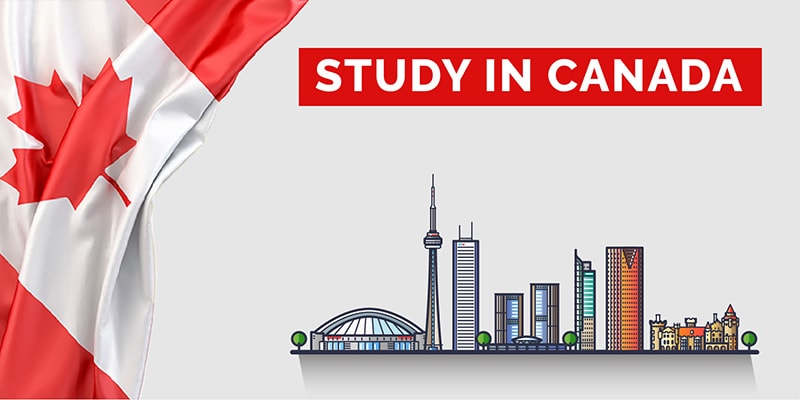
Thinking of studying in Canada and about to begin your admission application? This is for you. You will see information about:
– Searching for programs of study in Canada
– Admission requirements
– CV/statement of intent guide
– Finding a research supervisor
– Study options for students with low CGPA/Grades
– Possible sources of funding
To begin your admission application, it is important to answer these six (6) questions:
1. What do you want to study and at what level (undergraduate or Graduate)?
2. Which Canadian University offers the program of interest?
3. What are the admission requirements and cost?
4. Are you eligible?
5. How will you finance your program?
6. When and how will you submit your application?
Now, let’s talk about the six (6) important questions to answer as you begin your study abroad application process.
1. What do you want to study and at what level (undergraduate or Graduate)?
Answer the following yourself.
What’s my current level of education?
What am I currently doing professionally?
Where am I coming from or where do I see myself professionally in the future?
Which program suits this purpose?
What are my interests?
Think about these very well.
2. Which Canadian University offers the program of interest?
At this stage, believe me, Google comes in handy. For instance, if a Master’s Degree in Economics is what you are considering, use this keyword to search on Google “Masters in Economics program in Canada”
You will get enough information to start with. You can also search using UniCollegeLink or University Study or Educanada.
3. What are the admission requirements and cost?
From the information you got on Google, narrow down your choice and check the specific requirements of each university offering the program. Look out for required grade average, tuition, available funding, application fee, deadlines, etc
4. Are you eligible?
Now that you know the admission requirements, you will already know if to proceed or not.
Admission requirements vary by program/university, but generally, if you are applying for an undergraduate program, the main focus will be on your high school results. How ‘good’ your high school results should be will also depend on the program/university.
If you are applying from Nigeria, a minimum admission average of at least C4 is what I have mostly seen in a lot of the popular universities. If you have lower than this, you can try some universities in Atlantic Canada, or Colleges where undergraduate degrees are offered.
This admission average is calculated using 5 subjects but confirm what the school you are applying to requires.
If you’re applying for graduate study (Masters/Ph.D.), six factors are generally considered
A) Grade
B) Letter of Intent
C) CV
D) Letters of Recommendation
E) Proposed Research (if applying for thesis-based programs)
F) English Proficiency (if your previous Degree was not taught in English)
In addition to these six factors, some professional or business/finance-related programs may also require you to submit a standardized test result like the GMAT/GRE. Check the specific requirements of the course/program/university you are applying to, and present the document as required.
A) Grade
You do not need an Educational Credential Assessment (ECA), or any other degree evaluation to apply for admission to Canadian universities. But you will need your transcripts and certificates from all previous universities/colleges/polytechnics you have attended.
Masters/Ph.D. admissions in Canada are also competitive. The higher your CGPA, the higher your chances of getting in.
A 70-75% CGPA is usually the minimum grade required. On a CGPA scale of 5.0, that is at least 3.5, successful applicants and those offered entrance scholarships are likely those with higher grades.
If you don’t have this, there are other options to explore as well.
Masters/Ph.D. Options for students with low grades.
It is worth noting that when reviewing a graduate study application, more focus is also placed on the cumulative average in the last 2 years of undergraduate study.
So, if you have strong grades in the last 2 years, or you have years of professional experience or evidence of research productivity, you may give it a shot! You only miss all the chances you do not take.
In addition to this, you may want to also prioritize applying to schools that are not very popular or competitive or prioritize applying to schools where you are expected to secure a research supervisor before applying. If you are able to get a research supervisor, that would be very helpful. Your research supervisor may be able to put in more words for you during the admission review process, and that would significantly increase your chances.
The summary of some of the things you can do to improve your chances of studying abroad with a low grade are:
- Acquire professional work experience (even if it’s volunteering).
- Apply to lower-ranked universities.
- Build research and publications portfolio.
- Apply for other levels of study that are higher than a Bachelor’s Degree (and not a Master’s Degree).
- Write standardized tests and pass very well (like writing the GMAT, or GRE to study in the USA, or if required for your program).
- Secure a research supervisor.
- Do WES course-by-course evaluation for a country like the USA (so they can convert your grade to a 4.0 scale and remove the courses you failed).
- Apply to publicly funded state universities in the USA, or spread your applications to other countries in Europe/Asia/UK.
- Build your skills as you earn your degree!
Also, some schools in Canada that students in our corner have previously gotten into for a Master’s Degree (with a 2:2 or second-class lower grade) are:
- Royal Roads University
- Bishop’s University
- University Canada West
- Saint Mary’s University
- University of Regina
- Mount Saint Vincent University
- Memorial University
- Thompson Rivers University
- Crandall University
- University of New Brunswick
- Saint Paul University
- University of Prince Edward Island
Note that many of the students who achieved this and got into Masters/PhDs in Canada with a low grade had very well-prepared admission applications and complemented their low grades with one or more of the following:
- Higher grades in the last two years of undergraduate study.
- Writing the required standardized tests (i.e. GMAT/GRE) for their programs and passing very well.
- Good years of professional work experience in the proposed field of study.
- Well-prepared application documents (especially SOPs, recommendation letters, and CVs).
- Fantastic research experience, publications, and good research proposals.
- Securing a Professor who agreed to supervise their research.
The list of things to do to improve your chances of getting into a Graduate Program (Masters/PhDs) in Canada with a low grade is endless. The decision-making process of Graduate admissions in Canada is a holistic one, and you should be able to show that you have more than just grades, show that you are a choice candidate, and have what it takes to succeed in the program.
Now that you know some of those things, the responsibility to put in the work is now in your hands. I am rooting for you!
Other study options for students with low grades
If the above does not work out, there are also Canadian colleges that you can apply to. Have you heard of Colleges like Seneca, Humber, Conestoga, Nova Scotia Community College, etc. You can find some of the Colleges in the province of Ontario and the programs they offer on the Ontario Colleges Website.
If you have a first degree, consider applying for a Graduate Certificate program or Post-Graduate Diploma, or Post-Baccalaureate Diploma in these Colleges. These programs are higher in academic level or ranking than Ordinary or Advanced Diplomas and they provide practical training for students who already have a first degree.
The Graduate Certificate programs are also beneficial in a lot of ways. They are mostly a one- or two-year program and are eligible for the post-graduation work permit (PGWP). The PGWP allows eligible graduates to remain in Canada and work full-time after completing their program.
Graduate Certificate programs are also available and even more affordable in other parts of the country like New Brunswick, Newfoundland and Labrador, Nova Scotia, Manitoba, and Saskatchewan.
Do a Google search of Colleges in those provinces, and check for programs or courses you are interested in or eligible for.
In general, note that a low grade is not a death sentence. You may have to put in more effort than others, but it is not impossible. Focus on professional/personal development, and build the requisite skills that will make you an impeccable and choice candidate in your field.
Options for students with ND/HND
If you have an ND/HND, you are also eligible for the Graduate Certificate programs in Canada.
Applicants who have an ND/HND can use either or both of the two Diplomas to apply for the Graduate Certificate Programs.
B) Letter of Intent and Statement of Purpose
This gives you the opportunity to describe to the admissions committee your motivation and fit for the program. Use this to sell yourself!
State your academic background, accomplishments, and preparation for the program.
You can find samples and guides on how to write the statement of intent here.
In your Statement of Intent write about:
– Yourself and motivation for graduate study.
– Why you are choosing the specific program/University.
– Your skills/experiences and what will help you succeed in the program.
– Your goals during and after the program.
– How the program will help you achieve this.
You can also find the ingredients of a good statement of purpose prepared by:
- Dr. Olumuyiwa Igbalajobi on his Twitter page here.
- And his YouTube page here.
And the step-by-step guide on how to write a good statement of purpose by
- Oludayo Sokunbi (Deewon) on his Twitter page here.
- And his Youtube page here
C) CV/Resume
Use your CV/Resume to show proof of your outstanding academic, research, and professional experience. Ensure your CV fits what is expected by the university you are applying to.
There are Career Advancement Centres in all Canadian universities & they have their CV samples online. To find CV samples from the university you are applying to, Google is again your friend.
Do a Google search of the “University name & resume or CV guide”. For instance, “University of Calgary resume guide.” The top response will give you the page here.
I also made a post in the past where you can find templates of CV/Resume from Ten (10) Canadian Universities. This post is available here. And you can find another CV guide from Harvard University here.
D) Letters of Recommendations
This is an important document, and the number of letters needed will depend on the program/University.
Your referee should be someone who can assess your ability for graduate-level study, and affirm your potential to excel when admitted into the program.
Your graduate school recommendation letter should come from someone who knows your skills, professional experience, and academic capability. Importantly, contact your referees and confirm they will write you an individual-specific letter before submitting their names/details.
Your referees should also be able to speak to your competence and articulate the following for you:
- Your academic performance when they taught you or worked with you.
- Your research prowess if they worked with you in that capacity
- Your language proficiency and ability to speak and write fluently
- Your leadership, social attributes, and extracurricular capacity
- Examples of things they have worked on with you in the past
- Your general approach to work and life, and the ability to work well with others
- Other reasons why you will be a good fit for the program, and why you should be considered.
E) Proposed Research
If you are applying for a thesis-based program, you may be required to submit a draft of the research you intend to do. Some programs will also require you to find a supervisor before applying.
Make sure you do this if it applies to your program/University.
In fact, if you are applying for a Ph.D., I highly recommend that you contact and secure a research supervisor before applying for a program (even if it is stated on the website that it is not compulsory to secure one before applying).
If your interest is to do a Ph.D. in Canada, you should be able to start with 3 things by yourself (as someone who wants to do a rigorous research program).
- Search for schools where your program is offered.
- Check the admission requirements and determine your eligibility.
- Work on securing a potential research supervisor.
Your ability to do the 3 things above independently and by yourself will lay a good foundation for your success as a Ph.D. student. It will also prepare you for the rigor of doing independent research, and securing a supervisor will increase your chances of getting admission and a scholarship.
How can you find a supervisor (and send cold emails)?
Faculty members and their areas of research are usually listed on the program websites. By email, contact those whose research areas align with what you are proposing. Send your well-structured research proposal to them. Appeal to their interests!
In your email to a potential supervisor
– Briefly Introduce yourself.
– State the reason why you are contacting them.
– State what attracted you to them/their work and why you want to conduct your research under their supervision.
– Attach the proposed research for consideration.
You will find a useful guide on how to prepare the email here and another very good sample from a Professor here.
Additionally, the YouTube video by Dr. Olumuyiwa Igbalajobi is also useful and available here.
For those looking for a supervisor, you can also use LinkedIn to look for research supervisors or connect with Professors in your school.
– Go to LinkedIn
– Search the school’s name
– Select “People” filter at the top of the page
– Identify people and shoot your professional shot.
F) English Proficiency Test
It is only compulsory to provide an English proficiency test if your primary language, the language of instruction, and/or examination in your previous Degree was not in English. What I mean by this is that you don’t need IELTS if your previous Degree was taught in English Language.
If you are asked to submit IELTS, you can request a waiver. You can also check the language of instruction for your program on the World Higher Education Database and present this as evidence when you are requesting a waiver.
5. How will you finance your program?
Studying abroad will cost you money for tuition and living expenses. I know you will need money to pay for tuition & living expenses.
As a foreign student, you also need convincing proof of financial support to successfully get your visa. The proof of funds required for a Canadian study visa is at least the cost of the first-year tuition (which will depend on your school/program) and $10,000 CAD (for living expenses). More information on the total amount of money you need for yourself and/or your family to come to Canada as a student is available on the IRCC Website here.
So, in total, what it would cost you to study in Canada is the total of the tuition and the living expenses as outlined above.
Possible sources of funding are:
– Personal funds
– University (internal) scholarships
– External scholarships (from organizations/government)
– Research Grants (from supervisors).
I wrote more about this in the post on How to find scholarships and pay for your study in Canada.
In many Canadian universities, students are considered for internal scholarships when an admission application is submitted. A separate funding application is usually not required.
Check the above post and other posts on my website for more information on this. The other posts I recommend for you to check are:
- The 15 Canadian Universities with lots of scholarships. This is available here.
- The 10 Canadian scholarships you should not miss every year. This is available here.
6. When and how will you submit your application?
You will submit your admission application directly to your university/college of choice. On the course/program page, you will find information on how to submit an application for your particular program/course.
Submit your application ASAP! Applications are accepted in advance to allow enough time for admission/funding decisions and Visa applications.
Applications for Fall Term (September) resumptions are usually accepted from August/September of the previous year to January/February of the resumption year. Start your preparation as soon as possible, confirm the deadlines in your program of interest, and apply.
Applications are also submitted online, application fees are paid online, and electronic/scanned copies of transcripts, certificates, or other documents will be accepted in most (if not all) Canadian universities.
Original copies of documents may be requested after an offer has been made.
If you’ve come this far, you have done well! Now you know a few things about studying in Canada, admission requirements, documents required, possible sources of funding, etc.
If you have successfully secured an offer of admission and are about to apply for your study permit, you can also check the Canadian Study Permit Application Guide I prepared here.
One last and important thing to note!
Importantly, as an international student, it is highly recommended that you apply to an approved Designated Learning Institution and an Institution that would make you eligible for a Post-graduation work permit if you plan to stay back and work in Canada after your studies.
To apply for a study permit, you need an acceptance letter from a designated learning institution. A designated learning institution is a school approved by a provincial or territorial government to host international students.
To check if a school is a designated learning institution and if their programs are eligible for a Post-graduation work permit, check here.
Other resources to check out
If you made it to this part of the post, you have done well. I have some additional resources, mostly videos you can watch for more explanation on how to look for admissions and apply to study in Canada successfully.
You will find these resources here, and here
I hope you will find the post useful in some ways, and I wish you all the best in your application!
If you have questions on Career & Personal Development, Personal Finance, or Building a Personal Brand and want to reach out to us, check what we have here.
DISCLAIMER: The posts and information on this website are not legal advice. We are not Canadian Immigration Consultants and do NOT provide Canadian Immigration Services. For any authorized Canadian Immigration information, services, or support, please check the Government of Canada website at www.canada.ca/immigration
© Olu of Canada





Thank you for sharing. Very valuable and useful information shared.
God bless you.
I am grateful for this
Very detailed 👍.
Helpful
This is well detailed and helpful.
Thanks for the information.
Thank you, thank you very much! Very apt!
Thanks much more and God bless you!
Thanks, Olu of Canada. This is very detailed and concise, the tone of the article is also very positive and encouraging.
God will bless you mightily in Jesus name. Amen!!
Do we have any fully funded scholarship in any of colleges in Canada for Graduate Certificate Programs that someone can use HND to apply for
Thanks alot Mr.Olu
Hello sir, thank you for breaking the processes down. I appreciate your effort
Well details
Very helpful information
Thank you sir
Thank you prof, for the detailed information. I appreciate.
Wow!
This information is loaded.
And very helpful, thank you so much sir .
This is very helpful and very well detailed. Thank you very much.
This is very awesome. It indeed detailed. Thanks very much. I wish myself a successful application.
Appreciate this sir, at least you have given an ordinary brought up man like me to have all what it entails to study in Canada next year… Appreciate sir
Thank you Olu God bless you
Your type is rare , thank you
Thank you Sir, was really helpful
I really find this post helpful. Thanks for it.
Dr Olu, thanks a million for this post. It is extra-complete with no information omitted.
Very informative, thank you very much
Thank you so much Mr. Olu
Thank you so much Mr Olu